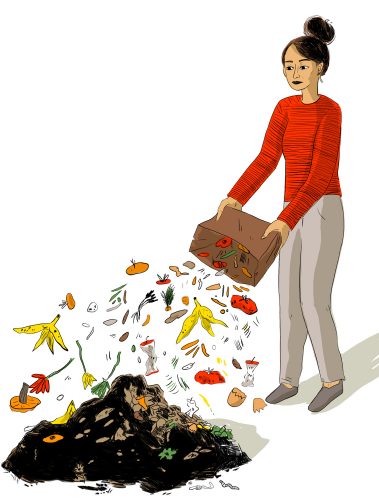
Going green can be achieved by making changes big or small. Three main contributors to greenhouse gases are transportation, what types of food you buy — i.e. where it comes from and how it’s packaged — and how you heat and cool your home, according to Linda Kelly with 350 Eugene.
“One of the main things to think about is our personal habits that can really affect our carbon footprint,” she says.
Little changes that people can make at home begin by taking shorter showers, washing clothes in cold water and putting on a sweater instead of turning up the heat.
“Get to know your neighbors,” Kelly tells me. Before going out to run errands, plan your trip. If you can’t bike or walk, Kelly suggests carpooling with the people next door.
Making sustainable changes on a budget in a small space may be more attainable than you think. At home, I use cooking products like olive oil or coconut oil — which double as my face and body moisturizers, eye makeup remover, shaving cream and deep hair conditioning treatment — to save money, and these oils don’t contain chemicals found in most moisturizers and beauty products.
Apple cider vinegar is great on salads and can be used for fighting off that icky onset of a cold — it also works well as a facial toner and a clarifying hair rinse. Instead of buying disposable plastic storage containers or plastic sealing bags, I use Mason jars for storing leftovers.
You can save money at the grocery store and transportation costs if you save the stalks of your romaine or butter lettuce. You can regrow them in a bowl of water and they tend to last for a couple of weeks.
I also hang all of my clothes on a drying rack instead of throwing them in a dryer.
Kelly says limiting dependence on fossil fuels, which is intertwined with almost everything we use regularly like transportation and product packaging, can begin by eating less meat. Buying locally grown food plays a big role in sustainability.
“You can go to the farmers market and use the SNAP [Supplemental Nutritional Assistance Program] card there,” Kelly says. “If you don’t have a backyard, you can get a plot at the community garden and meet a new friend.”
While there are tons of little changes you can make, advocacy is something everyone can take part in.
“Advocate for what you want and what’s happening on the very local level,” Kelly says. “Pay attention, go to city council meetings, go online and see what’s important like advocating for better and more consistent public transportation.”